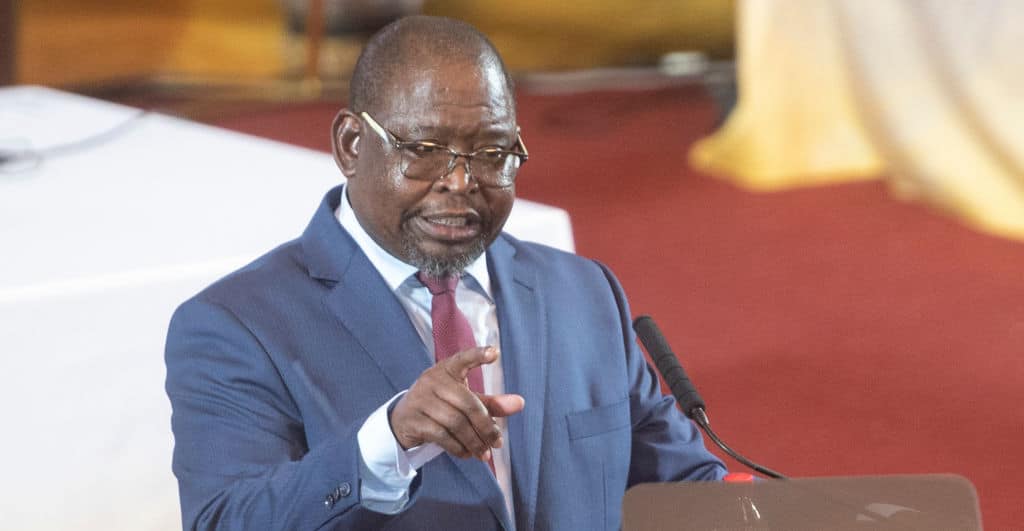Amid economic challenges, the country’s latest budget speech draws critical analysis from economist Dawie Roodt, shedding light on the fiscal strategies’ impact on economic growth and the path ahead for the nation.
In an era marked by economic turbulence, South Africa’s fiscal policy comes under scrutiny following the recent budget speech, aimed at addressing the nation’s pressing economic challenges. The speech was presented by Finance Minister Enoch Godongwana last week. Dawie Roodt, a renowned economist and Director of the Efficient Group, offers a candid assessment of the outlined fiscal measures and their potential trajectory for South Africa’s economy.
According to Minister Godongwana, the 2024 budget implements strategic expenditure cuts, aimed at achieving fiscal stability and economic resilience. Specifically, it targets a reduction in non-interest expenditure by ZAR80.6 billion ($4.19 billion) over the medium term, as part of a comprehensive fiscal consolidation strategy.
This measure is complemented by revenue adjustments, which have been revised upwards by ZAR45.6 billion ($2.3 billion) over the same period, compared to the 2023 Medium Term Budget Policy Statement projections.
Additionally, the budget proposes a reform of the Gold and Foreign Exchange Contingency Reserve Account. These adjustments are integral to the government’s efforts to manage the budget deficit and national debt, reflecting a focused approach to fiscal management in response to current economic challenges.
Loading...
Despite these state efforts to manage the deficit, Roodt critiques the sustainability of the fiscal account, warning of a looming financial crisis if the current borrowing trend continues in the face of a weak economy.
“The fiscal actions are part of the reason why the economy is not growing,” he says to FORBES AFRICA.
“The fiscal account has become unsustainable, and we are heading for a financial crisis,” Roodt adds, emphasizing the urgent need for a shift in fiscal strategy.
Highlighting state inefficiencies, Roodt points out that despite significant spending, outcomes, especially in education, are dismal.
“We spend a lot of money on education…but the outcome of education is horrible. The primary focus must be on the improvement of the efficiency of the state,” he says.
On healthcare, Roodt is skeptical about the implementation of significant spending towards health, including the National Health Insurance (NHI), citing financial constraints and efficiency issues.
“It’s simply going to cost too much money. We ran out of money already; and the government simply is not efficient enough to implement this.”
To combat the FATF greylisting, the government has allocated ZAR628 million ($32.7 million) towards implementing the FATF and State Capture Commission recommendations, totaling ZAR2.3 billion ($119 million) dedicated to these efforts. This budget allocation is part of a broader strategy to address the greylisting by enhancing legal and regulatory frameworks to meet international standards on anti-money laundering (AML) and combating the financing of terrorism (CFT).
Roodt, however, remains skeptical, describing the difficulties presented by the FATF greylisting, especially in the financial services industry, and the broader negative effects on South Africa’s international business relations.
Addressing social grants and public employment as mechanisms to mitigate poverty and unemployment, Roodt argues these measures are unsustainable without economic growth.
“This is totally unsustainable. You need economic growth. You’re not going to create jobs or mitigate poverty by spending more money on people,” he advises, calling for policies that truly stimulate economic growth.
The 2024 budget speech, amidst South Africa’s economic challenges, reflects a critical juncture in the country’s fiscal management. The government faces the dual task of stimulating economic growth while managing its debt and deficit.
Roodt’s analysis underscores the importance of efficiency and targeted spending, particularly in education and healthcare, to navigate the path toward sustainable development.
As South Africa addresses international concerns such as the FATF greylisting, the emphasis on reform and compliance highlights the broader effort to secure economic stability. The road ahead requires a balanced approach, integrating fiscal responsibility with strategic investments to foster a resilient and inclusive economy.
Loading...
